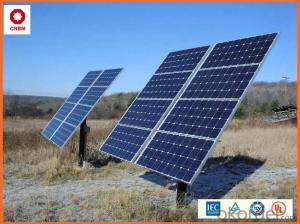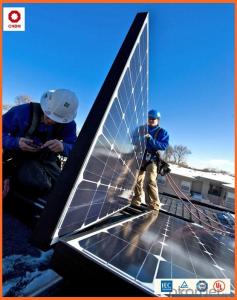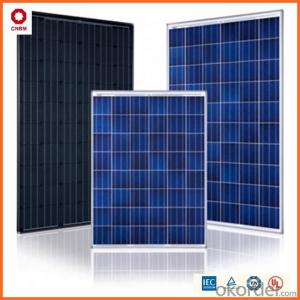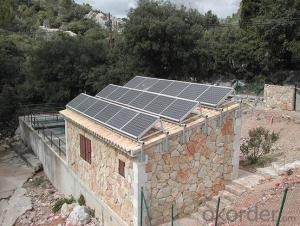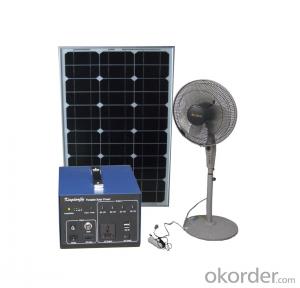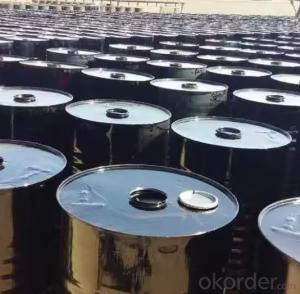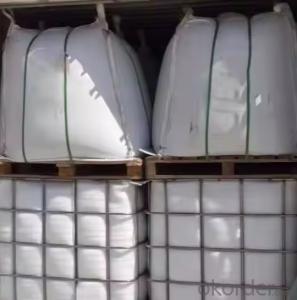!!! Hot On Sale!!! Stock 320w Poly Solar Panel USD0.46/W A Grade Good Solar Panel on Sale
- Loading Port:
- China main port
- Payment Terms:
- TT OR LC
- Min Order Qty:
- 1 watt
- Supply Capability:
- 10000000 watt/month
OKorder Service Pledge
OKorder Financial Service
You Might Also Like
Product Description:
Hot Sale !!! Quality and Safety of 245w-320w Poly Solar Panel
1. Rigorous quality control meets the highest international standards.
2. High-transmissivity low-iron tempered glass, strong aluminium frame.
3. Using UV-resistant silicon.
4. IS09001/14001/CE/TUV/UL
Warranties of 245w-320w Poly Solar Panel
1. 10 years limited product warranty
2. 15 years at 90% of the minimal rated power output
3. 25 years at 80% of the minimal rated power output
Technical date of 245w-320w Poly Solar Panel
ITEM NO.: | Mono 125*125 cell ,36pcs . Power range from 80Wp-100Wp | ||||||||
Maximum Power(W) | 80 | 85 | 90 | 95 | 100 | ||||
Optimum Power Voltage(Vmp) | 17.81 | 17.89 | 17.94 | 17.99 | 18.06 | ||||
Optimum Operatige Current(Imp) | 4.78 | 4.91 | 5.12 | 5.35 | 5.59 | ||||
Open Circuit Voltage(Voc) | 21.98 | 22.05 | 22.14 | 22.28 | 22.45 | ||||
Short Circuit Current(Isc) | 4.95 | 5.15 | 5.36 | 5.65 | 5.84 | ||||
Solar Cell: | 125*125 Mono | ||||||||
Number of Cell(pcs) | 4*9 | ||||||||
Brand Name of Solar Cells | JA Cell, Bluesun Cell | ||||||||
Size of Module(mm) | 1580*808*35 | ||||||||
Caple & Connector Type | Pass the TUV Certificate | ||||||||
Frame(Material Corners,etc.) | Aluminium-alloy | ||||||||
Backing (Brand Type) | TPT | ||||||||
Cell Efficiency for 100W(%) | 15.8% | ||||||||
Weight Per Piece(KG) | 12.0KG | ||||||||
FF (%) | 70-76% | ||||||||
Junction Box Type | Pass the TUV Certificate | ||||||||
Tolerance Wattage(e.g.+/-5%) | ±3%, or 0-3% | ||||||||
Front Glass Thikness(mm) | 3.2 | ||||||||
Temperature Coefficients of Isc(%) | +0.04 | ||||||||
Temperature Coefficients of Voc(%) | -0.38 | ||||||||
Temperature Coefficients of Pm(%) | -0.47 | ||||||||
Temperature Coefficients of Im(%) | +0.04 | ||||||||
Temperature Coefficients of Vm(%) | -0.38 | ||||||||
Temperature Range | -40°C to +85°C | ||||||||
Surface Maximum Load Capacity | 2400Pa | ||||||||
Allowable Hail Load | 23m/s ,7.53g | ||||||||
Bypass Diode Rating(A) | 12 | ||||||||
Warranty | 90% of 10 years,80% of 25 years. | ||||||||
Standard Test Conditions | AM1.5 1000W/ 25 +/-2°C | ||||||||
Packing | carton or pallet | ||||||||
1*20' | 25 Pallets / 450pcs | ||||||||
1*40'STD | 25 Pallets / 100pcs | ||||||||
Features of our products:
• High conversion efficiency mono/poly-crystalline amorphous silicon solar cells
• Modules incorporate high performance bypass diodes to minimize the power drop caused by shading
• High transmittance, low-iron tempered glass
• High performance EVA encapsulant to prevent destroying and water.
• AI frame: without screw, corner connection. 8 holes on the frame can be installed easily
• Good performance of preventing from atrocious weather such as wind and hails
• Certifications: CE IEC TUV VDE UL, Class I
• 10 years 90% power output warranty

Shipping of 245w-320w Poly Solar Panel
By Sea | Delivery from Shanghai or Ningbo seaport |
By Air | Departure from Shanghai Pudong Airport |
By Express | Post by DHL, EMS, UPS, TNT. |
- Q:What is the role of tracking systems in solar energy systems?
- The role of tracking systems in solar energy systems is to optimize the collection of sunlight by continuously adjusting the position of solar panels to maximize their exposure to the sun. Tracking systems help solar panels follow the sun's movement throughout the day, enabling them to capture the maximum amount of solar energy and generate more electricity. This enhances the overall efficiency and output of the solar energy system.
- Q:Can solar energy systems be used for powering disaster relief operations?
- Solar energy systems have demonstrated their worth in disaster relief efforts, serving as a highly valuable means of supplying electricity to affected areas. The deployment of solar panels and solar-powered generators to regions struck by natural calamities enables the provision of a dependable and sustainable source of power. A key advantage of solar energy systems lies in their ability to operate autonomously, independent of the power grid. This proves especially beneficial in disaster situations where the power infrastructure may be damaged or utterly destroyed. Solar panels are capable of generating electricity even in remote locations, thereby allowing relief workers to access power for vital operations, such as communication, medical services, lighting, and water purification. Furthermore, solar energy systems offer cost-effectiveness and environmental friendliness. Once installed, solar panels require minimal maintenance, with sunlight serving as an abundant and free energy source. Consequently, there is no need for costly fuel deliveries or the utilization of expensive diesel generators, which can pose logistical challenges and financial burdens in areas ravaged by disasters. Additionally, solar power produces no harmful emissions, thereby reducing the impact on the environment and enhancing air quality in already vulnerable regions. Moreover, solar energy systems can be easily scaled up to meet the escalating power requirements of disaster relief missions. Temporary solar arrays can be rapidly established, and if necessary, additional panels can be incorporated into the system to generate more electricity. This flexibility empowers relief organizations to adapt and respond to the changing needs of the affected population. Nevertheless, it is crucial to acknowledge that solar energy systems may have certain limitations. Their effectiveness is contingent upon the availability of sunlight, which can be influenced by weather conditions or geographical factors. In regions with limited sunlight or during periods of cloud cover, the system's output may be diminished. To surmount this challenge, energy storage solutions, such as batteries, can be integrated into the system to store surplus energy for use during periods of low sunlight. In conclusion, solar energy systems have consistently demonstrated their reliability, cost-effectiveness, and sustainability in powering disaster relief operations. They offer electricity independently of the grid, mitigate environmental impact, and can be readily expanded. By harnessing solar power, relief organizations can efficiently deliver essential services to those in need, thereby facilitating a swift recovery process in disaster-stricken areas.
- Q:Can solar energy systems be used in areas with limited access to maintenance services?
- Yes, solar energy systems can be used in areas with limited access to maintenance services. Solar panels are designed to be durable and require minimal maintenance. They have no moving parts, reducing the need for regular servicing. Additionally, advancements in solar technology have improved the reliability and longevity of these systems. However, occasional maintenance, such as cleaning and inspecting the panels, may still be necessary to ensure optimal performance.
- Q:What are the advantages of using solar energy?
- There are several advantages of using solar energy. Firstly, it is a renewable and abundant source of energy, meaning it will never run out. Solar energy is also environmentally friendly as it does not produce any harmful emissions or pollution during operation. Additionally, solar energy can help reduce electricity bills as it allows homeowners and businesses to generate their own electricity. It also provides energy independence, as it reduces reliance on fossil fuels and the grid. Moreover, solar energy systems are low maintenance and have a long lifespan, making them a cost-effective investment in the long run. Overall, the advantages of using solar energy include sustainability, environmental benefits, cost savings, and energy independence.
- Q:Can solar energy systems be used in areas with high levels of electromagnetic interference?
- Yes, solar energy systems can be used in areas with high levels of electromagnetic interference. However, it is important to ensure proper shielding and grounding of the system to minimize the impact of electromagnetic interference on its performance. Additionally, using high-quality equipment and implementing effective electromagnetic compatibility measures can help mitigate any potential issues caused by interference.
- Q:Can solar energy systems be used for powering off-grid eco-tourism destinations?
- Yes, solar energy systems can be an excellent choice for powering off-grid eco-tourism destinations. These systems harness the power of the sun to generate electricity, making them a sustainable and renewable energy source. Solar panels can be installed in remote areas, providing a reliable power supply for eco-tourism facilities such as lodges, campsites, or visitor centers. Additionally, solar energy systems can reduce reliance on fossil fuels, minimize carbon emissions, and align with the eco-friendly principles of such destinations.
- Q:Can solar energy systems be used in areas with strict building codes or homeowner association restrictions?
- Solar energy systems can indeed be used in areas with strict building codes or homeowner association restrictions. While it is true that some areas may have specific regulations or restrictions in place, many jurisdictions have recognized the importance of renewable energy and have amended their rules to accommodate the installation of solar panels. In areas with strict building codes, it is common for these codes to include provisions for solar energy systems. These provisions may outline specific requirements for the design, installation, and maintenance of solar panels to ensure they comply with safety standards. By following these guidelines, homeowners can install solar energy systems while still adhering to the building codes of their area. Similarly, many homeowner associations have also recognized the benefits of solar energy and have revised their restrictions to allow for the installation of solar panels. Homeowner associations may have specific guidelines in place regarding the placement, appearance, and integration of solar panels onto homes. By working closely with the homeowner association and following their guidelines, homeowners can successfully install solar energy systems in these communities. Additionally, there are federal and state laws in place that protect the rights of homeowners to install solar energy systems, regardless of strict building codes or homeowner association restrictions. These laws, known as solar access rights or solar rights laws, aim to ensure that homeowners have the freedom to generate their own renewable energy. They prohibit unreasonable restrictions on the installation of solar panels and provide legal mechanisms for homeowners to resolve any conflicts that may arise. In summary, while there may be challenges in areas with strict building codes or homeowner association restrictions, solar energy systems can still be used. By following the specific provisions and guidelines outlined in these regulations, homeowners can successfully install solar panels and harness the benefits of renewable energy. Additionally, solar access rights laws protect homeowners' rights to install solar energy systems, further ensuring their ability to utilize solar power.
- Q:Can solar energy systems be used for powering electric vehicle charging pads?
- Yes, solar energy systems can be used to power electric vehicle charging pads. Solar panels can be installed near the charging pads to capture sunlight and convert it into electricity, which can then be used to charge electric vehicles. This allows for sustainable and renewable energy sources to be utilized for electric vehicle charging.
- Q:What is a solar inverter and what does it do?
- A solar inverter is an essential component of a solar power system that converts the direct current (DC) electricity produced by solar panels into alternating current (AC) electricity, which is used to power our homes and businesses. It is responsible for optimizing the energy output from solar panels and synchronizing it with the electrical grid.
- Q:Can solar energy systems be used for powering off-grid cabins?
- Yes, solar energy systems can be used to power off-grid cabins. Solar panels can be installed on the roof or in a sunny location near the cabin to capture sunlight and convert it into electricity. This electricity can then be stored in batteries for use during periods of low sunlight or at night. With advancements in technology, solar energy systems have become an efficient and reliable option for powering off-grid cabins, providing a sustainable and renewable energy source.
1. Manufacturer Overview |
|
|---|---|
| Location | |
| Year Established | |
| Annual Output Value | |
| Main Markets | |
| Company Certifications | |
2. Manufacturer Certificates |
|
|---|---|
| a) Certification Name | |
| Range | |
| Reference | |
| Validity Period | |
3. Manufacturer Capability |
|
|---|---|
| a)Trade Capacity | |
| Nearest Port | |
| Export Percentage | |
| No.of Employees in Trade Department | |
| Language Spoken: | |
| b)Factory Information | |
| Factory Size: | |
| No. of Production Lines | |
| Contract Manufacturing | |
| Product Price Range | |
Send your message to us
!!! Hot On Sale!!! Stock 320w Poly Solar Panel USD0.46/W A Grade Good Solar Panel on Sale
- Loading Port:
- China main port
- Payment Terms:
- TT OR LC
- Min Order Qty:
- 1 watt
- Supply Capability:
- 10000000 watt/month
OKorder Service Pledge
OKorder Financial Service
Similar products
New products
Hot products
Hot Searches
Related keywords
